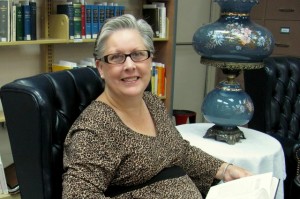Mary Keltner – Awaiting Kidney Transplant
 Life does not always turn out as we hope and expect it to as we travel through life.
Life does not always turn out as we hope and expect it to as we travel through life.
Sometimes we get to a turn in our journey and suddenly life does not look at all as we thought it would. I found this out nearly two years ago, when a case of “the flu” turned out to be a bit more than that.
After ten years at the Adair County Health Center I had gone to work at University of Kentucky Hospital, and then started working as a travel nurse in order to spend more time with my family and new granddaughter in the Washington, DC area.
One week I was working as a nurse on an oncology unit in Maryland, and the next week I was a patient there, needing blood transfusions and a kidney biopsy.
When the results of the kidney biopsy came in a few days later, saying that I was in shock was an understatement. The diagnosis was a rare form of glomerulonephritis, at stage 4 of the 5 stages of kidney disease and rapidly progressing.
As a nurse I was used to being the caretaker, not the patient, and the idea of having kidney disease was not an easy thing to adjust to. I had cared for kidney and transplant patients over the years, never expecting to be one.
During my time in the hospital, I even joked about wandering into the wrong room and nobody would let me out. And certainly no one ever expects to hear the term “catastrophic illness” in a sentence containing their name.
My kind and very caring nephrologist referred me to another kind and caring doctor at the National Institutes of Health (NIH) in Bethesda, Maryland, with the explanation that what I had was very rare and that there was not any known treatment for the disease.
The expectation was that if the disease continued at the current rapid rate of progression, I would be on dialysis very soon, as in within months. Even before the first appointment at NIH I was started on oral chemotherapy and high dose steroids to try to contain and slow down the damage to my kidneys.
Still in shock and quite honestly terrified, I contacted Dr. Phil Aaron, as I knew he had experienced what I was now going through. Talking with Dr. Phil was a tremendous help at that time, and continues to be a great resource on this journey.
At this point, I have had 6 months of oral chemotherapy, 9 months of steroids and numerous experimental biologic treatments at the NIH. The progress of my illness is in remission at present, although I am close to the point of needing dialysis and have not been able to return to work as a nurse.
I return to NIH every three months for follow-up and additional treatments if needed. Note: The National Institutes of Health is the world’s largest clinical research hospital, run by the Department of Health and Human Services. I think of it as “The Emerald City” of medical care, and any notion I might ever have of feeling sorry for myself is taken away with any period of time in a waiting room at the NIH. Very sick people from all over the world come there hoping for answers and a cure. There is always someone worse off than you are, and if you were able to walk in, you are way ahead of many patients.
As of August 2010, I have been added to the Region 11 kidney transplant list through the Vanderbilt Transplant Center.
While it will certainly be a few years before I could possibly receive a kidney transplant, every donor name added to the list of organ donors in this state decreases the wait for those in need of a transplant. Without more organ donors, many people will die before receiving a transplant.
While I need a kidney transplant, I am also listed as an organ donor and have been for many years. I think of it as a way to “pass myself on” and help others after I am gone.
Please add your name to the list of organ donors for the state of Kentucky. You never know whose life you might save, and it may be very close to home.